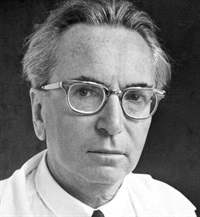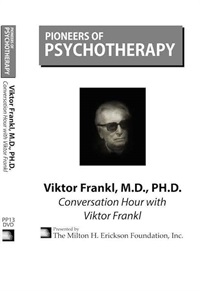Viktor Frankl, MD, PhD - Conversation Hour with Viktor Frankl, 12/12/1990, Video Stream More info »
Viktor Frankl, MD, PhD - Conversation Hour with Viktor Frankl
- Average Rating:
- Not yet rated
- Topic Areas:
- Clinical Demonstrations | Conversation Hours | Existential Therapy | Psychotherapy
- Categories:
- Evolution of Psychotherapy | Evolution of Psychotherapy 1990 | Pioneers of Psychotherapy
- Faculty:
- Viktor Frankl, MD, PhD
- Course Levels:
- Master Degree or Higher in Health-Related Field
- Duration:
- 1 Hour 20 Minutes
- Copyright:
-
Dec 12, 1990
- Publisher:
- The Milton H. Erickson Foundation Press
- License:
- Never Expires.
Tags: Ethics Existential Psychotherapy
Description
Description:
Viktor Frankl (1990) shares his experiences living in a WW-II concentration camp. He teaches the importance of creating meaning in one’s life and the application of ethics in daily choices. He emphasizes the importance of reconciliation in contrast to collective guilt and the importance of finding meaningful responses to all forms of tragedy.
Educational Objectives:
*Sessions may be edited for content and to preserve confidentiality*
Credits
Handouts
| EP90 - A Conversation Hour With Viktor Frankl, in The Evolution of Psychotherapy (90.9 KB) | Available after Purchase | ||
Faculty

Viktor Frankl, MD, PhD Related Seminars and Products
Viktor Emil Frankl, MD, PhD, was an Austrian neurologist and psychiatrist as well as a Holocaust survivor. Frankl was the founder of logotherapy, which is a form of existential analysis, the "Third Viennese School of Psychotherapy". He received his MD and PhD degrees from the University of Vienna where he studied psychiatry and neurology, focusing on the areas of suicide and depression.
His best-selling book Man's Search for Meaning (published under a different title in 1959: From Death-Camp to Existentialism, and originally published in 1946 as Trotzdem Ja Zum Leben Sagen: Ein Psychologe erlebt das Konzentrationslager, meaning Nevertheless, Say "Yes" to Life: A Psychologist Experiences the Concentration Camp) chronicles his experiences as a concentration camp inmate, which led him to discover the importance of finding meaning in all forms of existence, even the most brutal ones, and thus, a reason to continue living. Frankl became one of the key figures in existential therapy and a prominent source of inspiration for humanistic psychologists.


